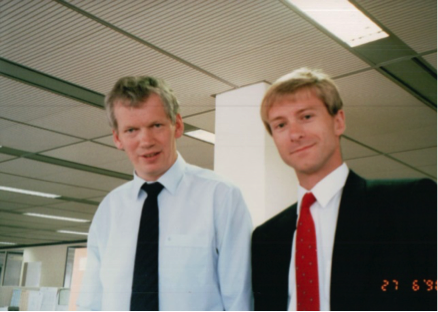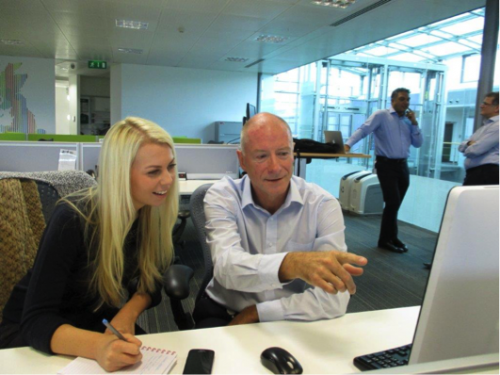
As a long time Networking Systems Engineer in Cisco and elsewhere, when I am asked to mentor new team members it causes me to think back to when I was a new SE. A lot has changed in the SE role in the last 20-30 years but there are some skills that are still just as important.
When I first started as a fresh network SE some very experienced colleagues mentored me, and I remember being told “I have forgotten more than you will ever know so just watch and learn!”
Now I find myself to be one of the more experienced SEs helping to mentor new SEs and apprentices working with our team and I say to them, “I have forgotten more than you will ever know, but don’t worry, it is all available instantly via google” (it’s on the web).
While this may be true for finding sources of technical information there are many skills that an SE has to build to help meet the ever-changing market and customer needs. In many cases the new team members have much to teach us as well.
What can the mentee learn from the mentor?
Our main role is to work with our customers and help them to work out how to meet their business requirements, and this means communications skills are very important. Some of the points below may be obvious but they all contribute to providing a better experience for our customers and are not always directly linked to technical skills –
- Customer relationships – finding and maintaining customer relationships is one of the most important aspects (over the years my best customer relationships are the ones I have built good trust with which has resulted in more fruitful discussions and opportunities)
- Contacts – make time to build and keep contacts, both inside and outside the company. You often bump into people again in a different role as they move around the industry
- Tools – highlighting which tools are the most useful and when to use them as there are many, and keeping up as the tools continue to change and improve
- Communications – providing clear and timely communications to avoid setting the wrong expectations with the customers and inside Cisco.
- Business knowledge – understanding the customer’s business and how IT can help them, and what their business growth plans are (business outcomes)
- Training – ensuring a relevant and structured training program for both soft and technical skills
- Prioritising – and of course how to prioritise your workload as there are often more demands than there is time available.
What can the mentor learn from the mentee?
The benefit is not all one-way however, and the mentees have a lot to offer to the mentors.
The newer SEs are doing large amounts of training and knowledge gathering in a very short space of time and as a result are very familiar with the latest training and information sources which they can share with us. Having been through education more recently they will also have new fresh approach and insights to solving challenges, which we can learn from.
Social networking is becoming increasingly useful for both technical and business collaboration, and the new SEs, having grown up with it, will fit well into this way of working and may be able to improve how we use it.
As we see the IT communications market moving ever more towards software and programming approaches to problem solving, developing new skills focused on software innovation is something the mentees are well placed to do which will be a real asset.
Questioning why we do things in a certain way adds value by asking us to take a new look at the way we do things and potentially improve them.
Below is a quote from Tori, an Apprentice at Cisco currently on an SE placement:
 “Being only six weeks into my SE placement, working with John and other experienced system engineers has really helped me get a better understanding of what the role really entails. When people give up the time to help mentor me I feel privileged. Now-a-days people are busier than ever, technology is growing at a very fast rate and processes are constantly strengthening. Therefore having someone share their experiences with me, in a way, gives me a head start. Personally, shadowing and listening to people helps me learn a lot faster than reading a book and it’s great to see so many people encouraging my development”.
“Being only six weeks into my SE placement, working with John and other experienced system engineers has really helped me get a better understanding of what the role really entails. When people give up the time to help mentor me I feel privileged. Now-a-days people are busier than ever, technology is growing at a very fast rate and processes are constantly strengthening. Therefore having someone share their experiences with me, in a way, gives me a head start. Personally, shadowing and listening to people helps me learn a lot faster than reading a book and it’s great to see so many people encouraging my development”.
The speed of technological change shows no sign of slowing and as the market we work in evolves, we need to be very flexible to continue to help our customers take the best advantage of the new developments. This involves us all, new and not so new, working together as a team to bring the best new solutions to our customers.
Finally, I see mentoring as a WIN-WIN situation, the mentee is constantly learning which will help them progress further, and as the mentor, I get fresh insight into the way we work and the satisfaction of knowing that I helped a young person in their career development.
2 Comments
Nice Blog John. Loving the photos (although i had to look twice at the first one before i realised that is you!).
It represents a pivotal moment when we get to a point in our career where we can play such an important role to bring onboard new and young talent, and realise that the teaching is a 2-way activity!
Great blog John – I like the way you bridge the 20/30 years